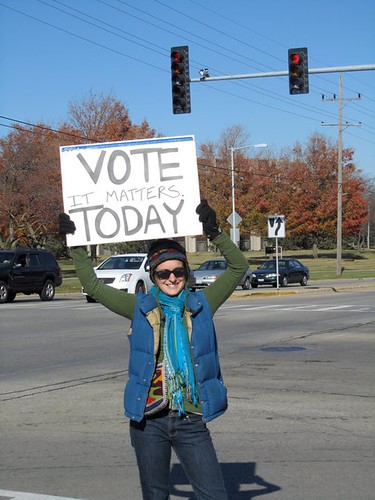 |
| Photo by Alec Sprague on Flickr |
I don't actually know who doesn't vote. All of my friends say they vote. Honestly, I'm so tied up with volunteer work and parenting that I don't have time to go on a political binge to "get out the vote." But I feel like the system is broken. Politicians are pandering to the minority who fund their campaigns, their ideologies don't match the realities, and the people will suffer for it. When we vote in what is often thought of as the most important election--the presidential election--the electoral college system douses our chances of ever having a real voice. Very little about this system really gives any individual the feeling of empowerment.
I'm already feeling the impact of executive decisions made by Brownback. I was looking forward to the day when I didn't have to pay $20,000 per year for family health insurance, but Brownback sent federal funding back that might help me select health insurance providers. I was hoping to get a loan through the Department of Energy grant that was funding the Efficiency Kansas program (see my previous blog). I must admit, I haven't faced any life-threatening situations because of budget cuts. But some people might actually become injured, ill or even die if they have to "prepare for less federal funding." Consider them, always, I'd say to the governor.
- Women and men who are battered by their partners and need help getting out
- Children who are abused
- People who were hoping to finally be able to find affordable insurance coverage and get medical treatment
- People in need of contraceptives or condoms
- People who need testing or treatment for STDs
- Women who need affordable gynecological exam and cancer screenings
- People with heart disease or diabetes
- Mentally ill and homeless
I wonder why there is such a disconnect between the people in charge of making these decisions and those who are impacted. Is it because they don't know any poor people? Do they not read the news? Are they simply lacking compassion for those who are less fortunate? Do they honestly believe that some other program will emerge in time to save the health and lives of those in danger?
The ironies of Governor Brownback's ideas on how federal money should be spent never cease. He is diverting federal money from programs that work (or haven't been given fighting chance) in order to promote programs that might look good to his followers, but in the end are disastrous. For example, the money "saved" when SRS offices close, along with federal grants (if he gets them) will help fund his faith-based marriage initiatives. SRS saves lives. Government-funded marriage meddling does not save lives. I don't want to fail to mention the new policies and cuts that might put Planned Parenthood offices out of business. Planned Parenthood is not just an abortion clinic, as Brownback seems to believe, and the services they provide can't be sought at Walgreens.
I have written before about Brownback's abolishment of the Kansas Arts Commission. But that's just the tip of the iceberg. I can't even begin to list everything he's fiddling with. But the tenor of his decisions are always the same: rely less on federal money, unless the money can be used to further his ideologies, and do what's best for big business, disregarding the little people. Now he's telling Kansas universities that they should consolidate programs that aren't attracting enough students and focus more on research.
“I think you need to look at consolidating some programs if they don’t have very many graduates in those areas,” Brownback said. “I’ve seen other states do that. It’s a way of concentrating resources in key areas. Again, I think you’ve got to be willing to make hard choices.”
Hard choices...like where will my children go to school now if they don't want to become pharmacists?
My children can't vote now, and they can't call Brownback to voice their opinion of their future college choices. But you can vote and voice your opinion in creative and powerful ways, as has been recently witnessed here in Kansas and in other states. And if you know someone who is impacted directly by misguided decisions in government, encourage them to do the same. Here are some resources for voicing your opinion at the federal and state levels:
Contact your U.S. House Representative
Contact your U.S. Senator
Find you Kansas Legislator
Kansas Governor’s office
Lawrence area Senators and House representatives
Senator Marci Francisco
Senator Tom Holland
Senator Anthony Hensley
Representative Terri Lois Gregory
Representative Anthony Brown
Representative Barbara Ballard
Representative Tom Sloan
Representative Paul Davis
Representative Ann Mah
Representative William R. Prescott
785-296-7644

